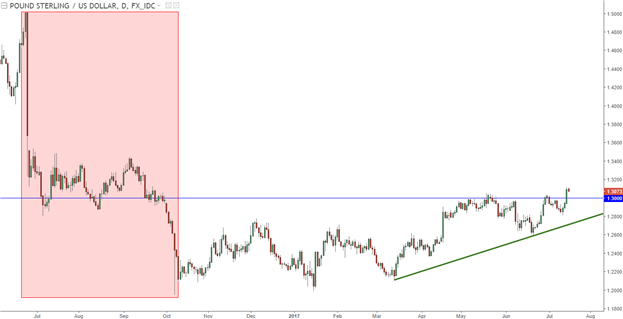Ever since the Brexit referendum, there’s been the fear that the ‘sharp repricing’ in the value of the British Pound would lead to unsavory levels of inflation. We were warned of as much by BoE Governor Mark Carney before the referendum ever happened; that a decision by voters to leave the EU would drive the value of Sterling lower, which would lead to higher levels of inflation that, eventually, could force the Bank of England’s hand away from loose policy options.
In the wake of the referendum, the BoE was rather clear: the brute uncertainty produced by Brexit was not to be taken lightly, and within months of the vote the Bank of England had already launched a ‘bazooka’ of stimulus designed to stimulate the economy through the uncertainty of negotiations. This dovish posture from the BoE functioned like a wet blanket to GBP price action, as each move-higher in the currency was promptly sold as an uber-dovish BoE was nowhere near ready to relent from their accommodative stance. This eventually led to the ‘flash crash’ as a dearth of demand for the British Pound allowed the currency to drop hundreds of pips in a matter of moments.
Prolonged Weakness in GBP/USD around Brexit with Prices Finally Showing Recovery

Chart prepared by James Stanley
But as we came into the New Year, and as no dizzying recession had yet engulfed the U.K. economy; we started to see the initial signs of capitulation within the BoE. The Chief Economist for the bank, Mr. Andy Haldane, held an interesting speech around the beginning of the year in which he claimed that the economics profession had their ‘Michael Fish moment’ around the Financial Collapse and again around Brexit. This seemingly highlights that while Brexit did produce considerable uncertainty, the brutal slowdown that the BoE thought would happen simply hadn’t materialized. What had started to show up, and what continued to grow was inflation; and not necessarily the type of inflation that Central Banks had spent the past few years trying to muster with growth in wages.











Leave A Comment